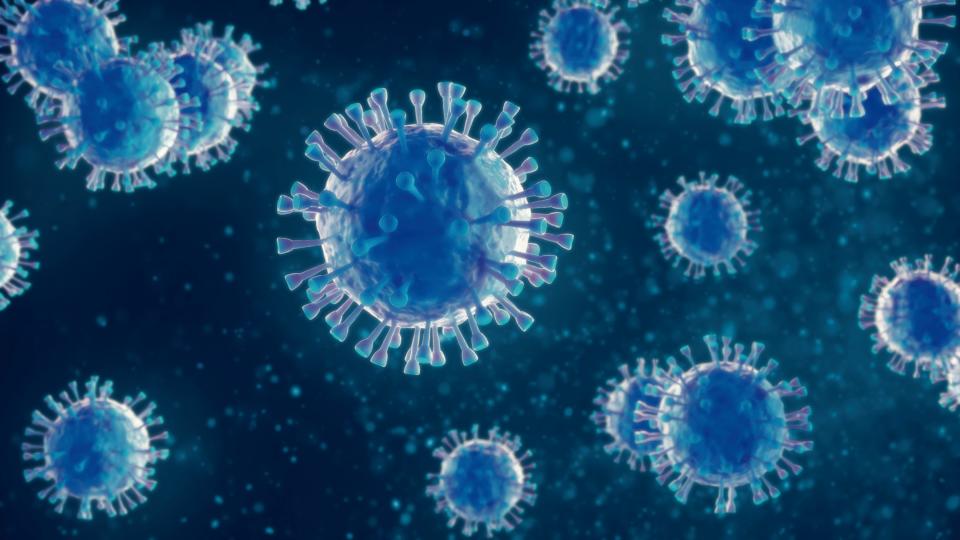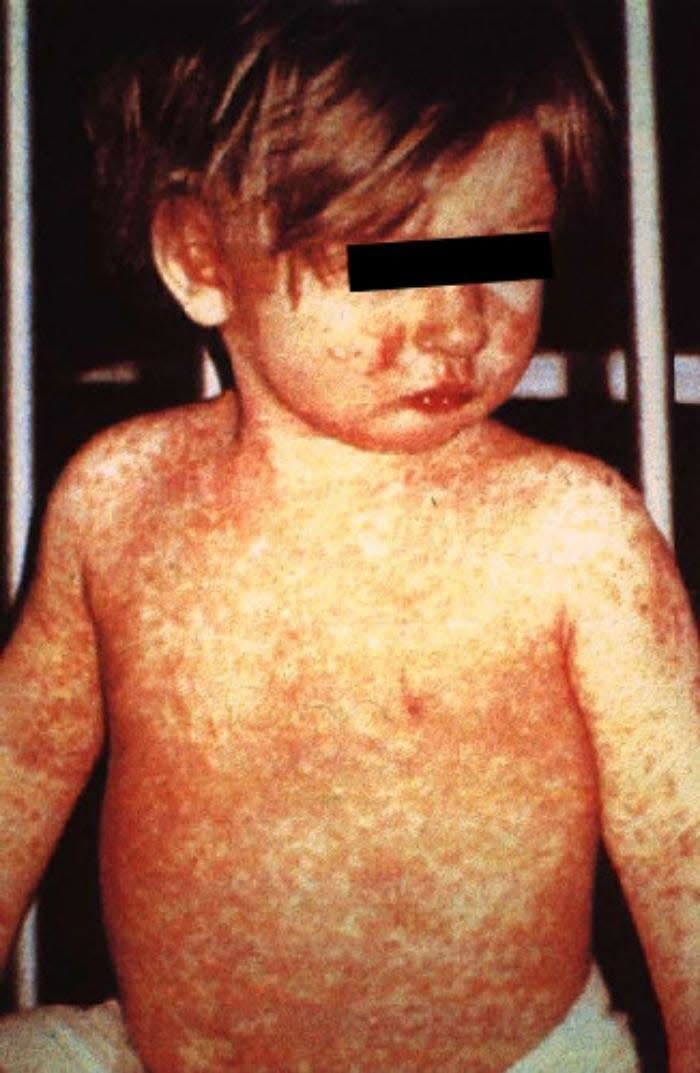Milwaukee health officials are following a few suspected measles cases. Why that is causing such concern?
Milwaukee health officials said Friday they are following a "few" suspected measles cases and contact tracing nearly 600 people who either had contact or visited the same locations as an individual with a confirmed case of measles.
On Tuesday, the City of Milwaukee Health Department announced that a Milwaukee resident who works in Waukesha County tested positive for measles. That individual is recovering and no longer contagious, said Mike Totoraitis, the city's health department commissioner.
Officials now are turning their attention to the suspected cases, meaning those individuals who are exhibiting symptoms. Dr. Heather Paradis, Milwaukee's chief medical officer, stressed these individuals are in isolation and may or may not have received the measles-mumps-rubella vaccine, known as the MMR.
"No vaccine is 100% effective," Paradis said. "Coverage can wane over time."
Still, there are several reasons the case has drawn special attention: The resident visited multiple locations, the disease is highly contagious, and vaccinations are down, much to the dismay of the medical community.
What is measles and how many Wisconsin children are unvaccinated?
Measles is a vaccine-preventable viral infection that spreads easily and can even be fatal for small children. It can be spread from person-to-person through the air and can stay in the air for two hours after a sick person coughs or sneezes.
Death rates have been falling worldwide as more children receive measles vaccines, which became widely available in the U.S. by the end of the 1960s.
However, the Journal Sentinel just highlighted a new report by the Wisconsin Policy Forum, which found that about 90,000 Wisconsin K-12 students ― or one in 10 students ― were not up-to-date on vaccines for preventable diseases like measles, polio and hepatitis B.
Where may people have been exposed in Milwaukee and Waukesha?
Milwaukee Health Department officials, alongside Waukesha County Health & Human Services and Wisconsin Department of Health Services, are working to identify and notify individuals who may have been exposed to the virus. The health department released the dates and locations, all in Milwaukee, the infected individual recently visited.
Mother of Good Counsel Parish, 6924 W. Lisbon Ave., Oct. 1, 11 a.m. - 4 p.m.
Walgreens ― 3233 S. 27th St., Oct. 2, 5 p.m. - 9 p.m.
Aurora St. Luke’s Emergency Department, 2900 W. Oklahoma Ave., (Aurora St. Luke’s Galleria Building – Breast Imaging, Pre-Admission Testing, Ambulatory Treatment Center, Outpatient Lab Draw Station), Oct. 2, 11 a.m. - 5 p.m.
Aurora Walker’s Point Community Clinic, CORE El Centro, Lotus Legal, Clock Shadow Creamery, 130-138 W. Bruce St., Oct. 4, 8 a.m. - 5 p.m.
What should I do if I was at one of these locations on the dates listed?
If you were at one of the locations and not experiencing any signs or symptoms, go to the City of Milwaukee Health Department’s Northwest Health Center Drive-Thru Clinic, at 7630 W. Mill Road, on Saturday to receive the MMR vaccination. The clinic will run from 10 a.m. to 3 p.m.

What should I do if I may have been exposed?
If you visited any of the locations above during the listed dates and times, the health department urges you to check your MMR immunization status as soon as possible to make sure you've been vaccinated against measles.
Individuals can access their immunization records using the Wisconsin Immunization Registry (WIR). Instructions are available in English, Spanish, and Hmong. If you are unable to access your records, please contact your doctor’s office or your local health department.
What are the symptoms of measles?
Measles symptoms typically begin to show seven to 14 days after an initial infection, the Centers for Disease Control and Prevention say. Symptoms can include:
Fever
Dry cough
Runny nose
Sore throat
Inflamed eyes (conjunctivitis)
Tiny white spots with bluish-white centers on a red background found inside the mouth on the inner lining of the cheek — also called Koplik's spots
A skin rash made up of large, flat blotches that often flow into one another
The measles infection typically progresses in stages over two-to-three weeks.
For the first 10 to 14 days, the measles virus spreads in the body, and no signs or symptoms are visible or experienced.
For the next two or three days, infected individuals experience a "mild illness," that can include symptoms like a mild-to-moderate fever, cough, sore throat and conjunctivitis.
The infected individual then experiences a rash made up of "small red spots, some of which are slightly raised." The rash first affects the face. "Over the next few days, the rash spreads down the arms, chest and back, then over the thighs, lower legs and feet. At the same time, the fever rises sharply, often as high as 104 to 105.8 F," Mayo Clinic says.
Mayo Clinic says the rash can last about seven days. Then, it fades along with the other symptoms.

What are the risks of measles?
Measles can be dangerous, especially for infants and young children. It can cause pneumonia. About 1 child out of every 1,000 who get measles will develop encephalitis — swelling of the brain — that can lead to convulsions and can leave a child deaf or with an intellectual disability.
One out of every four people who get measles in the United States will be hospitalized. One or two out of every 1,000 children in the United States who get measles will die from the disease, even with the best care, according to the Wisconsin Department of Health Services.
Where can I get a vaccine?
Health experts recommend that the best way to protect yourself against measles is to receive a vaccine against the virus. This is usually given as the combined measles-mumps-rubella (MMR) vaccine.
Saturday, Oct. 14, the City of Milwaukee Health Department’s Northwest Health Center Drive-Thru Clinic, at 7630 W. Mill Rd., will be administering the measles (MMR) vaccination, in addition to COVID-19 (for eligible individuals) and flu vaccinations. The clinic will run from 10 a.m. to 3 p.m.
Additionally, eligible adults and children who have not yet received the MMR vaccine can schedule a vaccination appointment at their local Walgreens or CVS pharmacy. In order to be eligible for the vaccine, you must never have been previously infected with measles, mumps or rubella.
When was the last measles outbreak in Wisconsin?
The last known measles outbreak in Wisconsin occurred in October 2021 at Fort McCoy, a U.S. Army installation in Monroe County, between Sparta and Tomah.
Twenty-two Afghan evacuees arrived at the installation infected with the virus. Fourteen required treatment at area hospitals.
Sarah Volpenhein of the Journal Sentinel staff contributed to this report.
This article originally appeared on Milwaukee Journal Sentinel: Why is measles causing such concern in Milwaukee?
